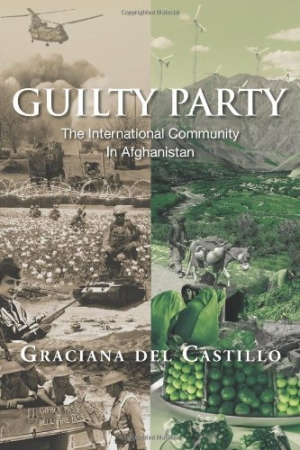Guilty Party
The International Community in Afghanistan
A history that names human failings and offers illuminating possibilities, this book is essential reading for all who wish to better understand the conflicts in Afghanistan.
Former UN economist Dr. Graciana del Castillo (Rebuilding War-Torn Countries, 2008) returns with a study on Afghanistan designed for laymen. By placing modern Afghanistan in historical context, del Castillo’s timely and intricate book is able to explicate the various causes of its current imbalances, as well as provide a possible program for a brighter future.
Del Castillo’s project has a personal edge. The author visits and falls in love with Afghanistan just weeks before the 1978 coup d’etat that renders it a steady pawn in the fight against communism. Early pages have the feel of a travelogue, as she meditates upon the historical and social forces that shaped the once-peaceful agrarian nation. The love she describes feeling for the country and its people is palpable and moving.
The bulk of the work, though, is devoted to exploring what went wrong across decades of war, and what course corrections might be made as Afghanistan plans its future. Historical chapters are linear, sophisticated, and illuminating, drawing upon del Castillo’s economic expertise to reveal the long-term consequences of swift political actions. Concentration may be required for full appreciation of her involved fiscal explorations, but the effort is worthwhile.
Tracing Afghanistan’s descent into political chaos in the last half of the twentieth century, these chapters show that international involvement created deep-seated economic dependencies. Del Castillo’s comprehensive and detailed explorations of outside forces acting upon Afghanistan cover the decades in which the nation lived with civil wars financed on one side by the Soviet Union, with opposition forces receiving support from the United States. The book shows how the Taliban took root in a nation that once evaded hints of theocratic rule, and helps to better explain the international complicity in its rise to power.
So, too, are post-9/11 activities critiqued, primarily for their focus on overhauling Afghanistan’s political system rather than creating interim economies of peace and reconstruction. Del Castillo reveals that the international community, against the advice of experts, neglected to learn from past interventions, and details failed policies of “reconstruction.”
Returning to Afghanistan in 2011, the author once again shows the growing nation through her eyes. Gone are formerly bucolic scenes, despite pockets of agricultural renewal. Emergent are buildings designed to withstand blasts or abandoned for their impracticality. The contrast is stark. The images del Castillo shares are, in and of themselves, enough to persuade that foreign actors have failed to comprehend the nation’s needs.
With the dual authority of a scholar and an inner-circle observer, del Castillo adds needed dimension to understandings of Afghanistan, and of the implications that impending U.S. withdrawal will carry. She estimates costs in the trillions and predicts continued political turmoil. Her advised program for course correction—which begins with simply considering the nation’s specific needs before acting—is compelling, if impossible to implement without cooperation.
Readers interested in sustainable peace may find themselves wishing for the coordination she proposes. A history that recognizes human failings and offers reflective, illuminating alternative possibilities, this book is essential reading for all who wish to better understand the roots of, and ramifications following, the conflicts in Afghanistan.
Reviewed by
Michelle Anne Schingler
Disclosure: This article is not an endorsement, but a review. The publisher of this book provided free copies of the book and paid a small fee to have their book reviewed by a professional reviewer. Foreword Reviews and Clarion Reviews make no guarantee that the publisher will receive a positive review. Foreword Magazine, Inc. is disclosing this in accordance with the Federal Trade Commission’s 16 CFR, Part 255.

